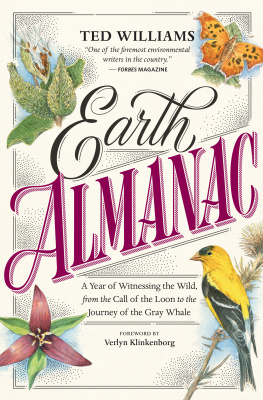University of Virginia Press
2014 by the Rector and Visitors of the University of Virginia
All rights reserved
Printed in the United States of America on acid-free paper
First published 2014
1 3 5 7 9 8 6 4 2
Library of Congress Cataloging-in-Publication Data
Williams, Michael, 19352009
To pass on a good earth : the life and work of Carl O. Sauer /
Michael Williams with David Lowenthal
and William M. Denevan.
pages cm
Includes bibliographical references and index.
ISBN 978-0-8139-3566-9 (cloth : alk. paper)
ISBN 978-0-8139-3577-5 (e-book)
1. Sauer, Carl Ortwin, 18891975. 2. Geographers
United States Biography. 3. Geography.
4. Human geography. I. Title.
G69.S29W55 2014
910.92 dc23
[B]
2013035018
Frontispiece: Carl Ortwin Sauer, 1944, by Dorothea Lange.
(Photograph courtesy of the Berkeley Department of Geography,
with permission from the Dorothea Lange Collection,
Oakland Museum of California)
[CONTENTS]
1
Warrenton of the Middle Border,
18891908
2
Graduate Studies and New Places,
19081915
3
Michigan, 19161923
4
Berkeley:
An Insider, 19231941
5
Larger Horizons of Place and Time:
Mexico and the Southwest, 19231935
6
The Frontiers of Knowledge
7
The Great God West of the Sierras
8
The Farthest Corridors of Human Time
9
The Heart of Human Geography
10
Born in Another Age
11
Mans Role in Changing the Face of the Earth
12
A Productive Retirement, 19571975
[FOREWORD]
Carl Sauer was my charismatic teacher. Michael Williams, steeped in the Sauer tradition, was my longtime friend and colleague. Much of this biography came into being during Michael and Eleanores several tenures in my Berkeley home, a scant stones throw from Sauers, and an easy walk from the University of California campus, where Sauer was for more than half a century a guiding beacon.
To introduce this substantive life of Americas most eminent geographer, crafted by a scholar of great distinction, is a task alike painful and chastening. Painful because both subject and author are no longer with us, and compeers are nowhere in sight. Chastening because Sauers mental universe, never confined by disciplinary boundaries, is already hard to convey to an audience today, just two generations beyond his seminal work and influence. The very existence of a polymath like Sauer, whose intellectual curiosity and drive embraced every epoch and every aspect of the ever-changing interplay between humans and their earthly home, is now almost impossible to imagine and virtually inconceivable in modern academe.
In this book, Michael Williams shows how a midwestern son of German immigrants married New World pragmatic know-how with Old World historical and scientific insights to become the acknowledged champion of a humanistic synthesis, in his own and in his disciples work, that illuminated myriad mysteries of human occupance, conquest, cultivation, and often ruination of the fruitful earth. Building on profoundly ecological insights, Sauer and his students explored the domestication of plants and animals; the transformation of prairie, rainforest, and savanna into cropland and pasture; and the traditional legends and cultural dreams that fueled settlement and prosperity but also triggered the abandonment and degradation of much of the globe. In so doing, Sauerians uniquely brought to bear insights from anthropology and history, geology and soil science, and agriculture and architecture, thereby promoting collaborative inquiry among scholars and sojourners of every stripe.
Yet the success of Sauers approach, along with its continuing vitality for many, was far from unalloyed. Indeed, Sauers life history was as much intellectual tragedy as victory, since many of the views he espoused were increasingly rejected in the postwar climate of culture-blind pontifical do-goodism. Sauers devotion to research untrammeled by social engineering; his growing dismay at the ahistorical scientistic assumptions of social scientists, coupled with their ignorance of the fundamentals of natural science; his continued insistence that ideas were best fostered by investment in individual scholars and personal partnership, rather than in lavish mammoth projects; his prescient yet still unfashionable alarm at the ecological devastation wrought by modern technology, all left him increasingly marginalized and discouraged. Finally, Sauer lived long and wisely enough to become aware that many of the conundrums that had engaged him, many of his bold excursions into arcane realms, needed to be explored with newly developed scientific techniques beyond his own training and expertise.
To Pass On a Good Earth illumines Sauers extraordinary intellectual career in full understanding of his doubts along with his certitudes, his weaknesses as well as his strengths, his failures along with his successes. Often dyspeptic, Sauer could be famously cantankerous. Intensely devoted to family and colleagues, he could be overbearing or forgetful. Michael Williams gives us a picture of the whole man, and shows how his family background and his personal traits intermesh with the singular qualities that made him one of Americas most treasured as well as troubled intellectual pioneers of the twentieth century.
Sauers magnetic enthusiasms mesmerized not only sober professors but visionary poets and won him the devotion of all those drawn to learn from him, as my own experience will illustrate. Like many other youngsters in the aftermath of the Second World War who had never studied geography before, I was intrigued by the eclectic and innovative work, ranging from the history of plant and animal domestication to the environmental and ecological attitudes of societies past and present the world over, carried on at Berkeley under Sauers aegis. An added attraction was his active encouragement of students from backgrounds other than geography; indeed, only two of the twenty graduate students in my cohort had majored in that field. Uniquely among American geography departments at the time, Berkeley embraced both scientific and humanistic insights and stressed geography as a bridging perspective rather than a field with some core terrain uniquely its own. While geography elsewhere dwelt chiefly on contemporary issues of economic development, regional planning, urban structure, and social systems, Berkeleys affinities under Sauer were with history, anthropology, and natural science. Sauer took all knowledge as his province, and he propelled his students into every imaginable realm of thought and terrain.
To broaden our intellectual horizons was the first imperative. Oh, Lowenthal, I see you did history; youd better get some understanding of soils and plants and animals. So I was shoved into Hans Jennys marvelous soil science course, and into another on the ecology of flora and fauna. Similarly, students whose background was in natural science would be pitch-forked into anthropology and history. All came together for Sauers own courses and seminars, and for the Thursday afternoon departmental teas where some visitor from an exotic land or scholarly calling, other Berkeley faculty, or a graduate student back from the field would perform and compel critique from each of us.















